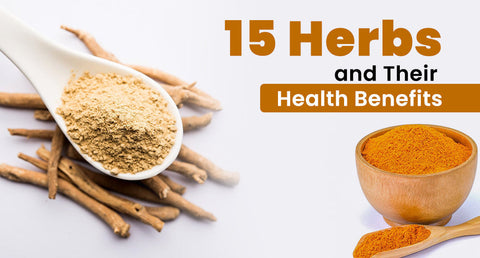Table of Content
For centuries, herbs have been used to flavour food, providing relief and supporting healing in various ailments and nourishing the body in remarkable ways, including fighting inflammation, boosting cognition, and managing stress. These herbs are natural powerhouses that not only enhance the taste of our food but also offer various health benefits. In this blog, we have listed 15 healing herbs and the health benefits of herbs.
Did you know? In India, there are over 7500 species of medicinal plants, many of which have been used in Ayurveda for thousands of years! From turmeric’s healing power to ashwagandha’s stress relief, Indian herbs are nature’s secret to wellness.
What Are Herbs?
Herbs are the roots, leaves or flowering parts of plants, often used for their aromatic properties in cooking, medicine, and spiritual practices. Unlike spices, which are derived from seeds, bark, roots, or fruits, herbs usually come from the more tender parts of plants. Some common herbs include basil, bay leaves, rosemary, chives and cilantro. Beyond their culinary uses, there are many benefits of herbs that have been recognised for their medicinal properties and play a crucial role in traditional medicine systems like Ayurveda, Traditional Chinese Medicine (TCM), and Western herbalism.
How Do Herbs Benefit Health?
Herbs contain phytochemical, natural compounds that have protective or disease-preventive properties. These compounds have antioxidant, anti-inflammatory, and even antimicrobial properties. Incorporating these healing herbs into your diet can reduce inflammation, boost immunity, aid digestion, and improve overall well-being. Herbs like turmeric and ginger combat chronic inflammation, while echinacea and holy basil strengthen the immune system. There are certain health benefits of herbs, such as peppermint and fennel, which improve digestion, while chamomile and ginseng help overcome stress and anxiety.
15 Powerful Herbs with Health Benefits
Here are 15 powerful healing herbs and their incredible health benefits. Easily available in our surroundings, you can experience the amazing benefits of these herbs. Let’s explore:
1. Turmeric

Turmeric is widely known for its vibrant yellow colour and active compound, curcumin, which has powerful anti-inflammatory and antioxidant properties that protect neurons from free radicals. Turmeric has been used for thousands of years in Ayurvedic and traditional Chinese medicine to treat skin disorders, respiratory problems, joint pains, and digestive disorders. Studies have shown that curcumin can alleviate symptoms of arthritis, lower inflammation, and even support brain health by improving cognition and minimising the risk of neurodegenerative diseases like Alzheimer’s. Regularly adding turmeric to your diet can help enhance immunity and combat oxidative stress and inflammation, making it a valuable herb for improving overall wellness. It also has antimicrobial and antiviral properties.
2. Ginger

Ginger has been used for centuries for its medicinal properties, particularly for digestive health. It is highly effective in reducing nausea, whether from morning or motion sickness and gastrointestinal issues. Ginger also has anti-inflammatory effects that can help reduce muscle soreness. Ginger root contains gingerol that benefits gastrointestinal motility, gas, and bloating and improves digestion. Whether adding it in paste, having it in a powdered form by adding it to meals, or consuming it in tea, ginger is a potent herb for digestive and overall health.
3. Garlic

Garlic is a flavourful herb consumed since ancient times. It is packed with medicinal benefits due to its high content of allicin, a compound with strong antimicrobial and immune-boosting properties. Studies suggest garlic can help lower blood pressure, improve metabolic disorders, reduce cholesterol levels, and support cardiovascular health. Additionally, its antibacterial and antiviral properties make it effective in fighting colds and infections. Consuming raw or cooked garlic regularly can strengthen the immune system and promote heart health. Garlic is also backed by research for its positive impact on arteries and blood pressure.
4. Peppermint

Peppermint is well known for its refreshing taste and ability to soothe digestive issues. It contains menthol, which helps relax the muscles in the digestive tract, making it an effective remedy for bloating, indigestion, and irritable bowel syndrome (IBS). Peppermint tea or peppermint essential oil is also beneficial for relieving acidity, and headache. Its natural cooling properties make it an excellent herb for relaxation and digestive comfort. Steam inhalation of menthol present in peppermint also helps in decongesting cold and flu.
5. Sage

Sage is a herb with a long history of medicinal use, particularly for improving brain health and memory enhancement. It is rich in antioxidants and other nutrients that have disease-fighting properties. Research shows that sage can improve cognitive function, protect against neurodegenerative diseases, and help in managing blood sugar levels. It also has antibacterial properties that can support oral health and reduce the chances of developing dental plaque. Incorporating sage into meals or drinking it as a tea can help support brain function and overall well-being. Fresh leaves can be added to soups, butter, and tomato sauce while dried leaves are softened and used as a seasoning for roasted vegetables.
6. Holy Basil (Tulsi)

Often called the “Queen of Herbs”, holy basil, or tulsi, is considered a sacred herb in India and is widely used in Ayurvedic medicine. A good source of antioxidants, and vitamins like A and C, tulsi has powerful anti-inflammatory, antibacterial, and adaptogenic properties, which help the body cope with stress. Its antibacterial effects support immune health by combating infections and protecting from cold and flu. It is also known to improve respiratory function. Drinking tulsi tea regularly can promote relaxation, support lung health, and detoxify the body.
7. Ginkgo Biloba

Ginkgo biloba is one of the oldest living tree species and is well known for its ability to enhance cognitive function. Some research also suggests that ginkgo biloba can help alleviate anxiety and improve mood. Taking it as a supplement or drinking ginkgo tea can support cognitive health, reducing risk of dementia. Quercitin present in Ginkgo biloba helps in the lowering respiratory infection by possessing immune modulatory and anti-inflammatory effects in the lining of lungs.
8. Chamomile

Chamomile is a gentle herb best known for its calming effects. It is often consumed as a tea to promote relaxation and improve sleep quality. Chamomile also has anti-inflammatory properties that can soothe digestive discomfort and reduce symptoms of anxiety. Regular consumption of chamomile tea can aid in better sleep, alleviate stress and anxiety, and lower symptoms of stomach spasms, flatulence or irritation.
9. Fenugreek

Fenugreek is a nutrient-rich herb that has been traditionally used to support digestion. It has a good amount of fibre and minerals, such as iron and manganese. Studies suggest that fenugreek seeds can help manage diabetes by lowering glucose levels and it is also known to support lactation in breastfeeding mothers. Soaking fenugreek seeds overnight and consuming them in the morning can help regulate metabolism and digestion. The high fibre content in fenugreek leaves also boosts digestive health and supports weight management.
10. Rosemary

Rosemary is an aromatic herb packed with compounds like rosmarinic and carnosic acids, which help enhance immunity due to their anti-inflammatory, anti-fungal and antiviral properties. It has been shown that consuming its extract helps enhance memory and sleep quality. Rosemary leaves are mainly used as a culinary herb or may be added to various dishes or tea. Additionally, one can use rosemary oil topically for better growth of hair and prevent the scalp from bacterial infection, one of the main causes of hair loss in some conditions.
11. Thyme

Thyme is a powerful herb with strong antibacterial and immune-boosting properties. It is often used to relieve respiratory conditions like coughs and sore throats. Thyme is also rich in antioxidants, which help protect the body from oxidative stress. Thymol, a main constituent in thyme is well known for possessing anti-oxidant, anti-inflammatory and anti-microbial properties. Adding thyme to soups, stews, or teas can be a natural way to support immunity and respiratory health.
12. Ashwagandha

Ashwagandha, also known as Withania somnifera, is an adaptogenic herb traditionally used in Ayurvedic medicine. It's believed to help the body manage stress by reducing cortisol levels, potentially alleviating anxiety and improving overall well-being. Some studies suggest that ashwagandha may enhance athletic performance by increasing VO2 max, which is a measure of lung and heart fitness. Additionally, it has been associated with improved sleep quality and mental alertness. Ashwagandha is also backed by research for increasing muscle mass and strength.
13. Brahmi

Brahmi, or Bacopa monnieri, is a staple in Ayurvedic medicine, renowned for its potential cognitive-enhancing properties. It's traditionally used to improve memory and cognition. Some studies suggest that Brahmi may help reduce symptoms of anxiety and stress. Additionally, it possesses antioxidant properties, which can protect cells from damage and reduce inflammation. Brahmi is also scientifically backed for its neuroprotective properties. Regular use or supplementation over several weeks is often necessary to observe these effects, and it's advisable to consult with a healthcare provider before starting any new supplement regimen.
14. Liquorice Root

Liquorice root, derived from the Glycyrrhiza glabra plant, has been used in various traditional medicine systems for its diverse health benefits. It's commonly utilised to soothe gastrointestinal issues, such as indigestion, stomach ulcers, and acid reflux, due to its anti-inflammatory and mucosal protective properties. Liquorice root also exhibits antiviral and antimicrobial effects, which can support immune and skin health. However, excessive consumption may lead to elevated blood pressure and reduced potassium levels, so it's important to use liquorice root under the guidance of a healthcare professional, especially for individuals with hypertension or heart conditions.
15. Moringa

Moringa oleifera, often referred to as the "drumstick tree" or "miracle tree," is known for its rich nutritional profile. Its leaves are abundant in vitamins A, C, and E, folic acid, calcium, potassium, and, iron. The high antioxidant content in moringa helps combat oxidative stress, potentially reducing the risk of chronic diseases. Some research also indicates that moringa can help lower blood sugar levels, making it beneficial for individuals with diabetes or those at risk. Incorporating moringa into the diet can be done through powders, teas, or capsules, but it's advisable to consult with a healthcare provider to determine the appropriate form and dosage.
Conclusion
Herbs have been an integral part of human health and wellness for centuries, offering both culinary delight and medicinal benefits. There are many health benefits of herbs, packed with powerful phytochemicals, they help reduce inflammation, boost immunity, aid digestion, and support mental well-being. From turmeric’s anti-inflammatory properties to ashwagandha’s stress relief and moringa’s nutrient-packed benefits, these healing herbs act as natural remedies overcoming illnesses and promoting the healing process. Many of these herbs have been staples in traditional medicine systems like Ayurveda. Incorporating them into daily life, whether as food, teas, or supplements, can enhance well-being naturally. However, it’s always advisable to consult a healthcare professional for proper usage and dosage.



